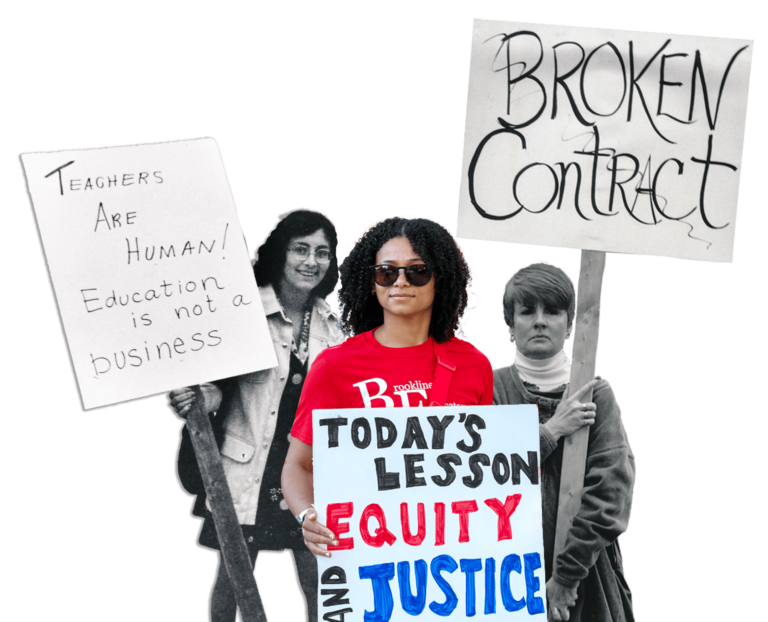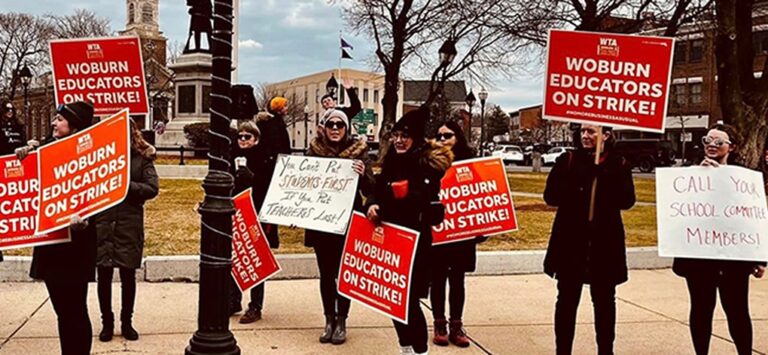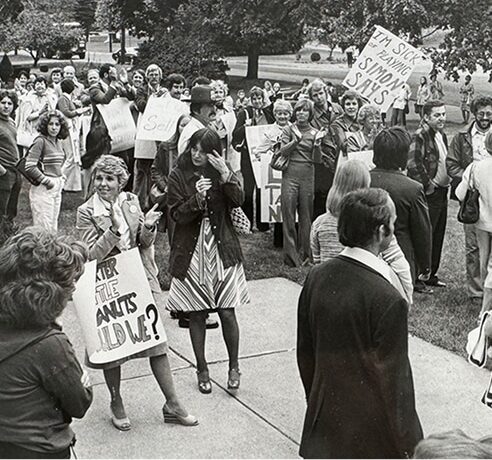About This Timeline
The timeline grew out of the MTA History Project, an initiative launched in 2023 to find, preserve and tell stories from MTA’s past. A resurgence in educator strike activity starting in 2019 led to questions from the media and members about the causes, duration and outcomes of past strikes compared to the recent ones. The History Project created this timeline to help answer those questions.
For information on strikes, we relied on the state findings as well as reporting in local, state and national media outlets and the MTA’s own publications, The Massachusetts Teacher and MTA Today. In some cases, we were provided firsthand accounts from MTA members and staff.

The first concerted work stoppages occurred after public employees won the right to bargaining collectively in 1965. Striking was illegal under that law and continues to be today. Work stoppages in the early years were handled by the courts and led to fines and even jail time for striking teachers.
The collective bargaining law was modified in 1973 and again in 1974 with passage of Chapter 150E, which included this definition of an unlawful work stoppage in Section 9(a): “No public employee or employee organization shall engage in a strike, and no public employee or employee organization shall induce, encourage or condone any strike, work stoppage, slowdown or withholding of services by such public employees.”
Under this law, employers who believe an educator strike is underway request a strike investigation by the Department of Labor Relations (DLR). If the DLR deems that activity to be an unlawful work stoppage, a cease and desist order is issued. Violating that order typically leads to sanctions, most often escalating fines. (The last time teachers were jailed for striking in Massachusetts was in 1980.)
A nine-day strike in New Bedford in 1969 was the first one by an MTA affiliate included in this timeline. It was the first multi-day strike and the first to impact student instructional days.
Interpretations of 9(a) have evolved over time. There is no bright-line distinction between a strike that shuts down a school for an entire day and a partial work stoppage, such as teachers leaving a required after-school meeting early en masse, or refusing to do certain activities that are customarily performed by educators in that local even if they aren’t required in the members’ most recent contract.
We include in this timeline any work stoppages that resulted in a finding that 9(a) had been violated by the local association. However, there are also some instances of obvious strike activity for which there was no 9(a) finding, including several one- and two-day strikes that were settled before a strike investigation was completed and a four-day strike in Grafton in 1980 for which no strike investigation report can be found. Thus, we also include in this timeline actions that the local and MTA considered a strike, even if there was no finding by the state.


This timeline is limited to strikes in MTA locals and does not include those affiliated with AFT Massachusetts, the union that represents educators in Boston, Lawrence, Peabody, Salem and other urban districts where educators have gone on strike. Notably, the first documented teachers’ strike in the state was in Lawrence in 1966, shortly after the first collective bargaining law for municipal employees went into effect. The last strike by an AFT Mass. affiliate was in Salem in 1994, when the members walked out on — you guessed it — Halloween.
A nine-day strike in New Bedford in 1969 was the first one by an MTA affiliate included in this timeline. It was the first multi-day strike and the first to impact student instructional days. In an article in The Massachusetts Teacher, MTA Field Director Frederick Lambert wrote, “Until September, 1969, five communities in Massachusetts had witnessed one- or two-day work stoppages of the ‘Professional Day’ variety.”
One of those was in Tewksbury in 1968 to protest the unilateral addition of a class period at the junior high school. If we collect more information about this strike and others not included here, we will update information in the Sources and Links document linked to from the timeline. If there are more strikes in the future, we intend to update both the fact sheets and the timeline itself.
Photographs used in the timeline were taken by MTA staff members unless otherwise credited.
Articles differ in how they refer to the length of a strike, some referencing calendar days and others work days. We refer to work days in our timeline since those are the only days an employee is actually on strike, though bargaining, picketing and other strike-related activity often occur on non-work days.
We would like to acknowledge the following for making this project possible. MTA President Max Page, Executive-Director Treasurer Mike Fadel, Communications Director Amanda Torres-Price and other members of MTA’s Public Relations & Organizing Committee; Laura Barrett, MTA History Project manager; Penelope Taylor, project assistant; retired MTA staff members Alice Paes, Tedi Winkler, Steve Day and Jean Conley; Lan Kantany of the Massachusetts Department of Labor Relations; members of MTA’s Communications, Legal and Field & Organizing Divisions; and timeline designers Jennifer Fox, Laura Birek and Jessica Summa Russo.

